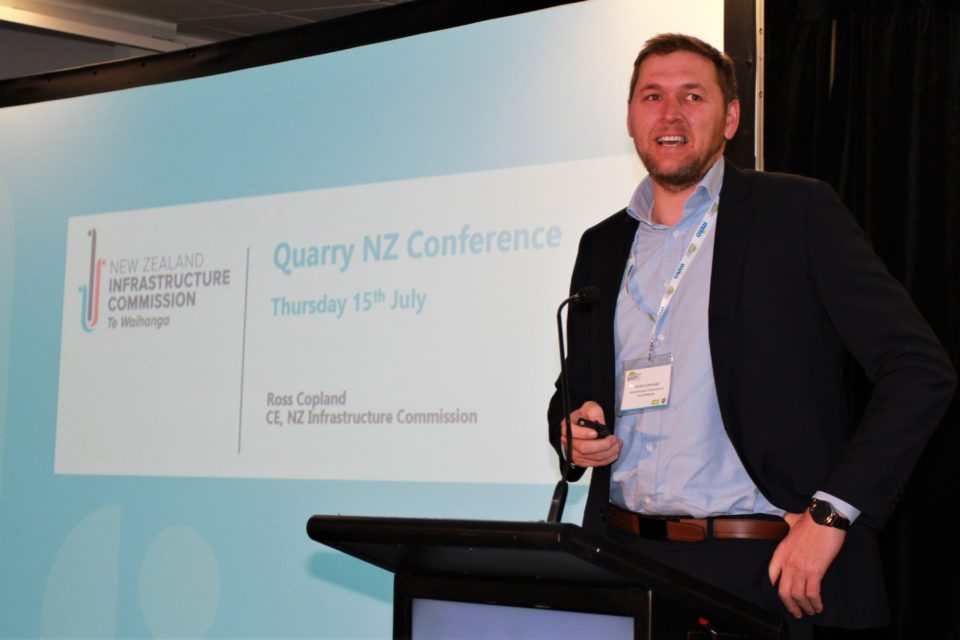Caption: Ross Copland at 2021 QuarryNZ Conference
By WAYNE SCOTT, CEO, AGGREGATE AND QUARRY ASSOCIATION.
Our country has a $75 billon plus infrastructure deficit to meet, Infrastructure Commission CEO Ross Copland told the 2021 QuarryNZ conference. Councils and anyone building or wanting a new home, roads or infrastructure need to take stock.
Ross grew up in Southland, a region he says has 1200 bridges. That alone gives you a picture of the scale of the infrastructure challenge facing us.
At our July Quarry Conference, he outlined the three key tasks of the Infrastructure Commission, established by the current Government in 2019:
- Developing a 30-year strategy to identify systemic issues and use foresight planning to address them.
- Supporting government agencies, local authorities and others to procure and deliver major infrastructure projects.
- Have an infrastructure pipeline to deliver a visible, coordinated pipeline of work enabling industry to plan ahead.
Ross told us currently there are $61 billion in infrastructure projects in the pipeline and even more will need to be spent to address our infrastructure deficit, as well as looking at non-built solutions. “There are significant cost pressures emerging,” he advised. But this is not news to our sector.
He won applause from the quarry audience in recognising the key role that aggregates, rock, and sand play in any infrastructure project and his call for decisionmakers to allow quarries to exist near urban centres.
“Our country has managed to create famine from plenty,” says Ross. “New Zealand was blessed with abundant aggregates but ‘nimbyism’ and planning inaction had meant aggregate supply is under pressure.”
He also acknowledged there is a very strong environmental and economic case for locating quarries close to their markets, as it reduced emissions and costs. And he hopes this is a message that the local government sector, in particular, will take into consideration.
Ross told us he believes the current blockage on quarries getting consents, or even renewals, potentially ran against the environmental objectives of dealing with climate change (the further you cart material, the more emissions and cost). He signalled that improved strategic planning would feature in the Infrastructure Commission’s draft 30-year strategy, due in September, and this will help quarries.
He says it is important to remind people in central and local government that aggregate goes into everything in infrastructure and encourages the quarry sector to make its voice heard.
“We need to look at this issue with the facts and in a balanced way.”
My view on hearing the presentation was that the industry has finally found a voice within the Government. It confirmed a pre-conference comment I made, where I quoted Infrastructure Commission chair, Dr Alan Bollard, saying red tape is making it almost impossible to establish a new quarry. The former Treasury secretary and Reserve Bank Governor has listed the cost and time pressures that have been imposed on infrastructure as one of the biggest challenges facing our nation; he cited, as an example, the difficulty faced in creating new quarries when we have such a large infrastructure deficit.
For years, the AQA has been telling various ministers and officials that if they didn’t start planning for quarries, this country will end up without enough aggregate and other quarried resources supply to build homes and roads. We are now seeing prices rise, as supply is unable to meet the twin demands of a booming housing market and major Government spending on infrastructure.
I have little doubt now that Ross Copland and Alan Bollard have the ear of Government. But given how slowly the wheels turn, the 30-year strategy won’t start to take effect for another two-to-three years. Then it will likely take a similar length of time for councils to respond and begin the necessary planning changes.
The question is whether Kiwis wanting their roading, homes and infrastructure are happy to wait several more years before they have the necessary secure supplies of aggregate, rock and sand to build them?
And where will they direct their anger in the interim?
There is no point throwing stones at quarries.



